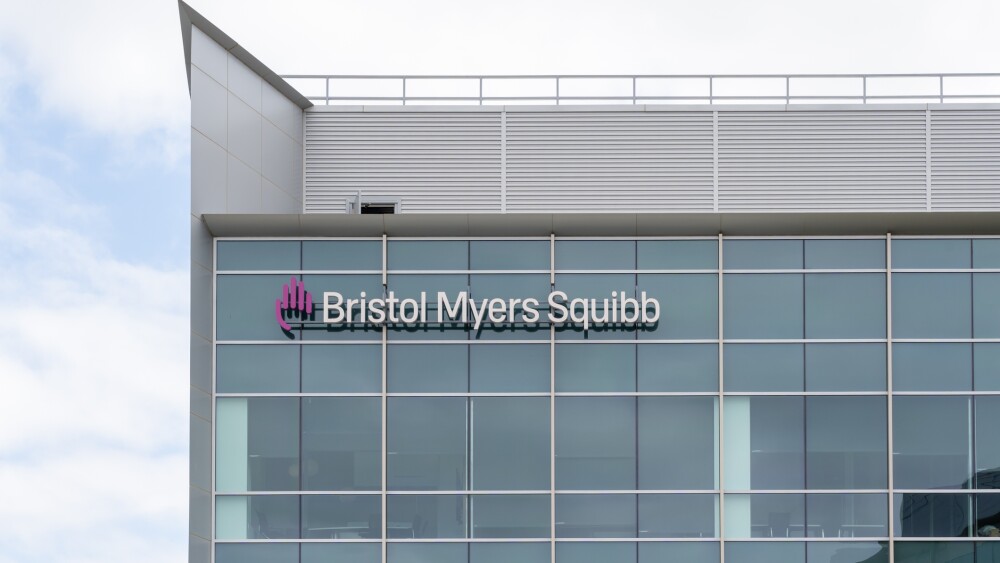PARIS, Oct. 31 /PRNewswire-FirstCall/ -- TEMODAL (R) (temozolomide) Capsules in combination with and following radiation therapy (RT) significantly improved median survival in patients with newly diagnosed glioblastoma multiforme (GBM) following resection (surgery) of their tumor, according to data presented today at the European Cancer Conference (ECCO 13). An 18.3 month median survival was observed in patients who underwent complete resection followed by TEMODAL and RT compared with 14.2 months for those receiving RT alone after complete resection.
The study was conducted by the European Organisation for Research and Treatment of Cancer (EORTC) in collaboration with the National Cancer Institute of Canada (NCIC) Clinical Trials Group. In this multicenter trial of 573 patients with newly diagnosed GBM, patients were randomized to either TEMODAL/RT combination therapy or RT alone. Surgery included complete resection (39 percent of patients), partial resection (44 percent of patients), or biopsy (16 percent of patients.) Overall survival was the primary endpoint of the study.
Treatment with TEMODAL/RT and followed by TEMODAL demonstrated an overall survival benefit compared to RT alone across all patient groups: those whose tumors were completely resected (18.3 months for patients receiving TEMODAL/RT vs. 14.2 months for those receiving RT alone); those whose tumors were partially resected (13.5 months for patients receiving TEMODAL/RT vs. 11.7 months for those receiving RT alone); or those whose tumors were biopsied (9.4 months for those receiving TEMODAL/RT vs. 7.9 months for patients receiving RT alone).
Improvement was also demonstrated in two-year survival rates among patients who underwent complete tumor resection (37.1 percent for patients who received TEMODAL vs. 14.5 percent for those who received RT alone); partial tumor resection (23.2 percent for patients who received TEMODAL/RT vs. 8.9 percent for those receiving RT alone); or tumor biopsy (10 percent for patients who received TEMODAL/RT vs. 4.6 percent for those receiving RT alone).
"Our expectations were exceeded in this study, particularly among patients who underwent complete resection followed by TEMODAL and radiation therapy. Median patient survival increased as much as four months in this study, which is a benefit for patients living with this devastating disease," said Dr. Martin van den Bent, MD, PhD, head of the Neuro-Oncology Unit, Daniel den Hoed Cancer Center, Erasmus University Medical Center, Rotterdam, the Netherlands, and a principle study investigator.
About Gliomas
Malignant gliomas are primary brain tumors that develop from glial cells. Approximately 30 percent of primary brain tumors are gliomas, which affect approximately six to eight people per 100,000 people worldwide. Both glioblastoma multiforme (GBM) and anaplastic astrocytoma (AA) are types of gliomas. GBM is the most common and aggressive form of primary brain tumor.
About Temozolomide
Temozolomide is an oral, cytotoxic alkylating agent. Cytotoxic agents are designed to prevent the replication of cells that divide rapidly, including those in tumors. TEMODAL was initially approved in the European Union (EU) in 1999 for the treatment of patients with malignant glioma, such as GBM or anaplastic astrocytoma, showing recurrence or progression after standard therapy. In June 2005, TEMODAL received marketing approval in the EU for the treatment of patients with newly diagnosed GBM. TEMODAL treatment was generally well tolerated; the most commonly observed adverse events (greater than 10 percent) in patients receiving TEMODAL in combination with radiotherapy followed by TEMODAL monotherapy included decreased appetite, headache, constipation, nausea, vomiting, hair loss, rash, convulsions, fatigue, diarrhea, stomatitis and blurred vision. Low white blood cells and low platelets, which are known dose-limiting toxicities for most cytotoxic agents, including TEMODAL, were observed. When laboratory abnormalities and adverse events were combined across concomitant and monotherapy treatment phases, Grade 3 or Grade 4 neutrophil abnormalities including neutropenic events were observed in 8 percent of the patients. Grade 3 or Grade 4 thrombocyte abnormalities, including thrombocytopenic events were observed in 14 percent of the patients who received TEMODAL.
Schering-Plough received accelerated approval in the US for refractory AA in 1999 and full approval of temozolomide (marketed in the US as TEMODAR(R)) from the U.S. Food and Drug Administration (FDA) in March 2005 for refractory AA in patients who have experienced disease progression on a drug regimen containing nitrosurea and procarbazine, and for the treatment of newly diagnosed GBM in combination with radiotherapy and then as maintenance therapy. The development of temozolomide for additional markets and expanded indications is consistent with Schering-Plough's strategy to broaden its oncology portfolio and is in line with its plans to build strength in its global franchises through both internal research and external collaborations and licensing opportunities.
Important Information Regarding U.S. Labeling for TEMODAR with Newly Diagnosed GBM
TEMODAR (R)(temozolomide) Capsules are indicated for the treatment of adult patients with newly diagnosed glioblastoma multiforme concomitantly with radiotherapy and then as maintenance treatment. TEMODAR Capsules are indicated for the treatment of adult patients with refractory anaplastic astrocytoma, ie, patients who have experienced disease progression on a drug regimen containing nitrosourea and procarbazine. Patients treated with TEMODAR Capsules may experience myelosuppression. Geriatric patients and women have been shown in clinical trials to have a higher risk of developing myelosuppression. TEMODAR Capsules are contraindicated in patients who have a history of hypersensitivity to any of its components, or to DTIC. Caution should be exercised when administered to those with severe hepatic or renal impairment. TEMODAR may cause fetal harm when administered to a pregnant woman. Nursing should be discontinued in women receiving TEMODAR. The effectiveness of TEMODAR in children has not been established. TEMODAR Capsules should not be opened or chewed. If capsules are accidentally opened or damaged, rigorous precautions should be taken with the capsule contents to avoid inhalation or contact with the skin or mucous membranes. Prophylaxis against Pneumocystis carinii pneumonia (PCP) is required in all patients receiving TEMODAR in combination with radiotherapy for the 42-day regimen. There may be a higher occurrence of PCP when temozolomide is administered during longer dosing regimens with or without radiotherapy. All patients receiving TEMODAR, particularly patients receiving steroids, should be observed closely for the development of PCP regardless of the regimen. As noted in the U.S. package insert, during the concomitant phase (TEMODAR + radiotherapy), adverse events including thrombocytopenia, nausea, vomiting, loss of appetite, and constipation, were more frequent in the TEMODAR + radiotherapy arm versus the radiotherapy arm alone. The incidence of other adverse events was comparable in the two arms. The most common adverse events across the cumulative TEMODAR experience were hair loss, nausea, vomiting, decrease in appetite, fatigue, headache and constipation.
About Schering-Plough Corporation
Schering-Plough Corporation is a global science-based health care company with leading prescription, consumer and animal health products. Through internal research and collaborations with partners, Schering-Plough discovers, develops, manufactures and markets advanced drug therapies to meet important medical needs. Schering-Plough's vision is to earn the trust of the physicians, patients and customers served by its more than 30,000 people around the world. The company is based in Kenilworth, N.J., and its Web site is http://www.scheringplough.com.
SCHERING-PLOUGH DISCLOSURE NOTICE: The information in this press release includes certain "forward-looking statements" within the meaning of the Securities Litigation Reform Act of 1995, including statements relating to the potential market for TEMODAL and the company's strategy. Forward-looking statements relate to expectations or forecasts of future events. Schering- Plough does not assume the obligation to update any forward-looking statement. Many factors could cause actual results to differ from Schering-Plough's forward-looking statements. Many factors could cause actual results to differ materially from Schering-Plough's forward-looking statements, including market forces, economic factors, product availability, current and future branded, generic or over-the-counter competition and the regulatory process, among other uncertainties. For further details about these and other factors that may impact the forward-looking statements, see Schering-Plough's Securities and Exchange Commission filings, including the company's third quarter 2005 10-Q.
Schering-Plough CorporationCONTACT: Media: Joy Schmitt, +1-908-298-3944, Gail Thornton,+1-908-392-3420, Investors: Alex Kelly, +1-908-298-7436
Web site: http://www.scheringplough.com/




